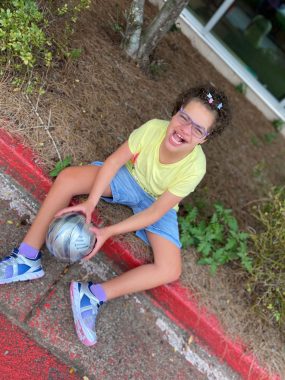How My Angel Uses Exercise as an Early Intervention Against Obesity
A caregiver makes her daughter's play and health a priority through soccer
Written by |

Exercise can be a great way to combat some of the physical difficulties brought on by Angelman syndrome (AS). Getting my 12-year-old Angel, Juliana, to move is a fun and healthy endeavor. While a variety of exercises could keep Angels active, we’ve chosen soccer to get Juliana moving and engaging with peers outside of school.
Angelman syndrome is a neurogenetic disorder that wreaks havoc on Angels’ bodies. Because of patients’ ataxia — a loss of muscle control that can affect voluntary movements — and other limitations from AS, their walking and moving don’t come easily. Juliana began walking when she was almost 4. Other than transitioning between rough surfaces and navigating stairs, she has reached her stride.
But when Angels start moving, it’s important to keep them moving. Obesity is a real problem for adults who have Angelman syndrome. Genetic factors, a strong desire to eat, and limited access to exercise all contribute to the problem.
Finding the right exercise for Juliana has been a little tricky. It’s not because she’s lazy; it’s just that some of the physical activities can be taxing and difficult to manage. When I didn’t fully understand Juliana’s limitations, I tried doing some kiddie yoga with her. Even with me putting her in the various poses, it was too difficult to do. While yoga is great and easy for some, it wasn’t a practical choice for Juliana.
Now that she is walking, taking a stroll at the park or through the neighborhood is an easy task to manage. But the activity that has been our go-to for Juliana has been soccer. Our local YMCA has a team that is specifically for kiddos with special needs. Juliana joined it several years ago and was active on the team until COVID-19 brought things to a halt.
Balls are made for throwing
If you saw Juliana on the soccer field, you might conclude that she is better at basketball or baseball than soccer. Balls of all shapes and sizes are fun for Juliana, and when she sees them, her inclination is to throw them. Unless you’re the goalie, you shouldn’t be touching the ball in soccer. But we don’t worry about such rules on Juliana’s team. The goal is to get the children moving and having fun.
Soccer is an area — one of many — where I’m seeing Juliana blossom and grow. We had our first practice last week. Parents can head onto the field with their children or let the volunteers work with them. I knew Juliana would be more productive having me as her coach, so I headed to the play area with her.
“Run, run, run, Juliana,” I called out as we headed toward a group of balls. “OK, stop. Kick, kick, kick!” This was my directive over and over. With my constant coaching and praise, Juliana kept kicking the ball.
She listened to my instructions and followed through. Angels can be hyperactive, with short attention spans. Her lack of focus makes it difficult for Juliana to learn. But even in soccer, repetition works like a charm. In all the years that she’s played soccer, I’ve never seen her kick the ball so many times.
After our long hiatus, I’m glad Juliana gets to return to the field. With her on-demand kicks and bubbly excitement, I think she’s glad to be back, too.

Juliana cools down after her first soccer practice of the year. (Photo by Sabrina L. Johnson)
Note: Angelman Syndrome News is strictly a news and information website about the disease. It does not provide medical advice, diagnosis, or treatment. This content is not intended to be a substitute for professional medical advice, diagnosis, or treatment. Always seek the advice of your physician or other qualified health provider with any questions you may have regarding a medical condition. Never disregard professional medical advice or delay in seeking it because of something you have read on this website. The opinions expressed in this column are not those of Angelman Syndrome News or its parent company, Bionews, and are intended to spark discussion about issues pertaining to Angelman syndrome.







Susan Wyatt
How can I get exercise in for an adult angel, 38 years old? He doesn't walk well at all. And he is not very cooperative.
Sabrina L. Johnson
Hello Susan, it sounds like you have quite the strong-willed adult on your hands. Juliana is only 12, but I don't pick fights unless I have to--she's as stubborn as they come. I would try "sneaking" the exercise into something that he likes to do. Some days, we simply head to the pool just so Juliana can move around. Getting her in and out of the pool is really her workout. Angels may never be able to do exercise as an average person would, but I think finding small ways for them to move goes a long way. Keep trying and push him to be active on his cooperative days if you can.